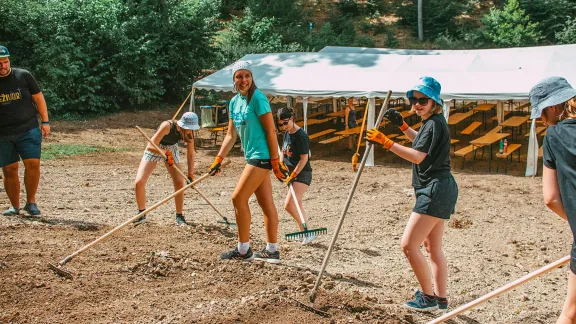
Outdoor workshops for young people particularly affected by the lockdown measures in Slovakia. Photo: Evangelical Church of the Augsburg Confession in the Slovak Republic
Over EUR 1.1 million distributed to 181 member church projects in 53 countries
(LWI) - Through The Lutheran World Federation (LWF) Rapid Response Fund, the communion was able to rally support and provide direct and indirect relief to congregations and local communities facing the unprecedented challenges of the COVID-19 pandemic. “This stands out as an affirmation of the member churches’ and LWF’s partners’ shared solidarity and commitment to leave no one behind.”
The Lutheran communion’s response “stands out as an affirmation of the member churches’ and LWF’s partners’ shared solidarity and commitment to leave no one behind”
Ms Rebekka Meissner, LWF Program Executive for Member Church Projects made these remarks during a presentation on the impact of the LWF COVID-19 Rapid Response Fund (RRF) in 2020 and 2021. Several member churches, related agencies and private donors contributed toward projects implemented in three phases to assist congregations and local communities who faced significant needs in Africa, Asia, Europe and Latin America and the Caribbean.
Overall, the LWF provided short-term grants totaling EUR 1,142,919 for 181 projects by 87 member churches in 53 countries, bringing direct and indirect relief to thousands of people.

An overview of amounts allocated to RRF projects implemented by 34 LWF member churches in Asia; 25 in Africa; 12 in Europe and 16 in Latin America and the Caribbean.
The intervention ranged from food distribution to raising awareness on protective measures to stop the spread of the coronavirus, creating opportunities to earn a living and supporting school children. Many churches also addressed the increased cases of gender-based and domestic violence. Several churches invested in communication tools for online worship, and provided psychosocial and pastoral care.
While the support was initially meant for immediate relief, in many places its impact went beyond addressing basic needs, Meissner said, citing examples from the different regions. A COVID-19 awareness campaign by the Church of the Lutheran Brethren of Cameroon included distribution of hand-washing kits to parishes, churches and church offices, mosques and other public places. The project, she noted, reached more than 50,000 people of different faiths and backgrounds and also served as a strong testimony of interreligious solidarity.

Distibution of hand-washing kits to places of worship in Cameroon. Photo: LWF/ Church of the Lutheran Brethren of Cameroon
The Evangelical Church of the Augsburg Confession in the Slovak Republic set up training and structured work experiences for young people particularly affected by the lockdown measures. Outdoor workshops held in the forest were a creative way of strengthening theoretical and practical skills and nurturing reflection and spiritual growth through morning devotions, fellowship gatherings and peer-to-peer discussions.

Church-led training workshops for young people, aimed also at nurturing spiritual growth. Photo: Evangelical Church of the Augsburg Confession in the Slovak Republic
In Indonesia, the Protestant Christian Batak Church (HKBP) started a fish-farming project to promote food security for families affected by the economic backlash of COVID-19. The activities involve youth and women groups from the Christian and Muslim communities.

Youth and women from Christian and Muslim communities take part in a training session on fish farming techniques. Photo: HKBP
In Argentina, the Evangelical Church of the River Plate (IERP) offered training for women, who upon release from prison remain under house arrest, and are thus excluded from the mainstream job market. The skills in bakery, management, administration and accounting increased their access to work opportunities and enhanced the living conditions of their families.
“The RRF shows how churches in challenging times continue offering their vibrant witness by addressing each other’s needs, and through messages of hope and solidarity,” Meissner added.
By LWF/P. Mumia
The LWF COVID-19 Rapid Response Fund was launched in April 2020. The goal is to support the communion’s member churches, particularly the most vulnerable ones that still require urgent assistance during the global health emergency.


